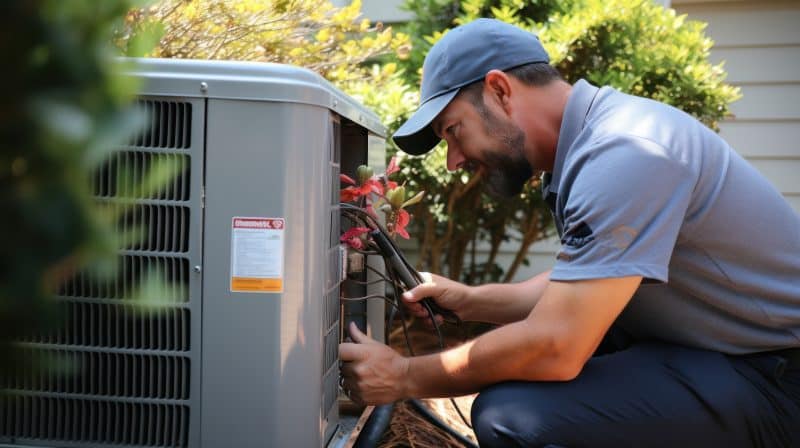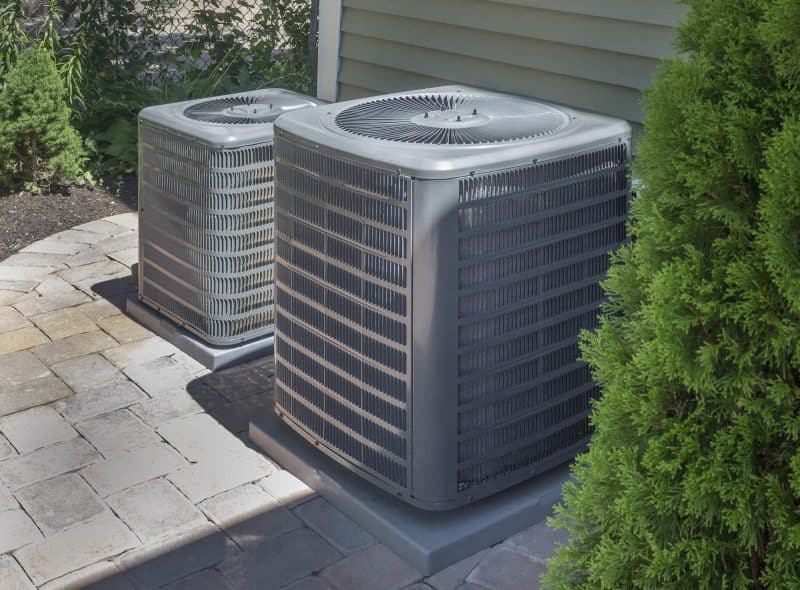If your thermostat is revolting as you try to lower the temperature in your home, it’s time to consider a backup plan this summer. Upgrading your home’s air conditioning will not only keep you cool during the heat waves, but it can also add value to your home. From new build installations to replacements and upgrades, our team at Dyand Mechanical is here to help you find the right product. Let’s take a closer look at the cost breakdown and facts you may not know about your air conditioner.
How Much Does an Air Conditioner Cost in Edmonton?
A new air conditioner purchase and installation can cost anywhere from $2,500 to $12,000, with the average cost in 2024 falling between $4500 and $5500 in the Edmonton area. Every installation estimate will be unique, but an air conditioner estimate considers the following:
- The size of your home
- The ceiling height
- The age of your home
- The amount of sunlight and shade you get in the summer
- The type of AC you choose
- The existing ductwork
- The number of people in your household
A new high-efficiency air conditioner can save you 30-50% energy consumption each month due to newer technology and central cooling designs. The best time to buy an air conditioner to maximize your savings is during the off-season winter months, but we recommend booking an installation in the spring months. With regular maintenance, your air conditioner can last 12-15 years.

What Size of Air Conditioner Do I Need?
As a rule of thumb, the best BTU for your home is 20 BTUs per square foot. The size of the air conditioner for your home is determined by the size of the room or area that you would like cooled, the local climate, the insulation in your home, and the number of windows and doors through which air can escape. Before you buy, our qualified HVAC technicians will perform a heat load calculation for your home to help you measure the BTUs required for your air conditioner. Every home will be different, but the more accurate the BTU rating, the more money you will save in cooling bills this summer. Request a quote today to get your customized recommendations for your home!

How Does an Air Conditioner Work?
- Air Intake: The air conditioner draws warm air from the room through a fan.
- Filtration: The air passes through a filter, removing dust, particles, and allergens and improving air quality.
- Coolant Circulation: A compressor pressurizes and circulates a refrigerant (coolant) through coils.
- Compression: The refrigerant, now a high-pressure, high-temperature gas, moves to the condenser coil outside the unit.
- Heat Exchange: In the condenser coil, the hot gas releases heat to the outside air and transforms it into a high-pressure liquid.
- Expansion Valve: The high-pressure liquid moves through an expansion valve, reducing pressure and temperature.
- Evaporator Coil: The low-pressure, low-temperature liquid enters the evaporator coil inside the unit.
- Heat Absorption: Warm air from the room passes over the cold evaporator coil, and the refrigerant absorbs heat, turning it into a low-pressure gas.
- Return to Compressor: The low-pressure gas returns to the compressor to restart the cycle.
- Cool Air Release: The now-cooled air is pushed back into the room, reducing the overall temperature.
- Humidity Control: As the air cools, moisture condenses on the evaporator coil, reducing humidity in the room.
Should You Run Your Air Conditioner During Smoke Season?
As a quick answer, you can run central air conditioning during poor air quality warnings and forest fire season, as it is designed to filter particulates from the air as it circulates. That being said, the answer will vary depending on the type of air conditioner. Window air conditioners should not be used as they will bring in smoke from the outdoors.

4 Factors to Consider Before Running Your AC in the Smoke
- Type of Air Filter: If your air conditioner has a high-efficiency particulate air (HEPA) filter or another filter designed to capture fine particles, it can help reduce the entry of smoke particles into your home. Check your filter specifications and consider upgrading to a more efficient filter during the smoke season.
- Indoor Air Quality: If the outdoor air quality is severely compromised due to smoke, running the AC with the windows and doors closed may help maintain better indoor air quality. Ensure that your home is properly sealed to prevent outdoor air from entering.
- Air Recirculation: Many modern air conditioners have a “recirculation” or “recycle” mode, which circulates indoor air without drawing in outside air. Using this mode can help minimize the intake of outdoor pollutants, including smoke.
- Regular Maintenance: Ensure that your air conditioner is well-maintained. Clean or replace the air filter regularly, as a dirty filter can reduce the system’s efficiency in filtering out particles.
Are you ready to upgrade your cooling system? Make the call today! At Dyand Mechanical, we believe in delivering top-notch air conditioning installations and repairs across Edmonton. Contact us today to receive a free quote and inspection from our HVAC technicians, so you can get back to preparing for summer.




